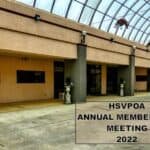At the July 7, 2021 Board Discussion Session, Interim GM Discussed the Board Vote (June 16, 2021) on Balboa Club Renovation, Forensic Mapping of the Streets, Road Repair, and Striping.
Paul said, “I wanted to put this on there [on the list of subjects to be discussed at the Discussion Session] just to make you aware of where we are. At the last meeting or the meeting before, I can’t remember which one, you approved rollover funds that were both utility-based and non-utility-based. In that approval was $518,992 for road repair, $190,619 for road striping, the forensic mapping of the streets for $136,949, and the Balboa Club renovation for $291,145.”
Here is the June 16, 2021 motion that mentions the details in the attachment.
13_Memo_-_Reserve_and_Capital_ObligationsGM Makes Board Aware of the Approval of Rollover Funds
Paul continued, “I just want to make you aware that these funds were approved and we’re moving towards doing those. The reason that we’ve held off was waiting on the PPP loan to be forgiven. These are not PPP loan funds that we’re using. The PPP loan was made for [the purpose of] payroll…Because of the budget and because of where we were in the budget, we wanted to make sure that the PPP loans were forgiven before we went to spend this money. Is that a fair assessment, Coreena? Would you add anything to that?”
Controller, Coreena Fetterhoff said, “this is from doing better than expected last year and allocating the funds from the rest of 2020.”
Funds to be Used for Road Repair, Striping, and Forensic Mapping
Paul said, “there is a list of road repairs on there that would be done with this money. Jason, if you want to come up. You’ve got a bid on asphalt now and you’ve got a bid on striping which you said was a pretty good bid. Is that correct?”
Jason Temple, Director of Public Services said, “that is correct. We’re trying to add two contractors under contract for striping and for laying our asphalt. We double-checked. Their prices are very competitive, even if we were to go out for bids again, the current unit prices would be competitive. So we could just continue the process with the two contractors that we have for striping and paving.”
Temple continued, “Staff will still have to go out in front and do the preparations, as much as possible. That kind of saves a little bit of money and where we can’t, we can pay the contractor to get out there and do the road prep and pave it too, as well.”
Paul said, “I have eye-balled many of these sites, myself,”…and many of these sites really need the work done. “These things have been promised, in some cases, two, three, four years”… “These are the worst of the worst… Jason, how far do you feel we can get on this for what your bids are now? Do you think we can get most of this done now, with the change in price and everything?”
Temple said, “probably a little bit less than our first submittal. I do feel because of the staff strain that we have right now, we may have to hire the contractor to do more road prep work than what was originally planned, but a lot of that will get done.”
“We have $518,992 in road repair and $190,619. The object of those two numbers, they may change between those two. There may be less striping and more road repair or more striping and less road repair. But those two numbers – we’ll stay within those two numbers on the total…The FRAFT Committee has really recommended this forensic road-mapping as a key to the future of the roads and designating which roads, down the road, that they do. They think that is a necessity,” explained Paul.
GM Says Balboa Club Renovation to be Held to $50,000
“The Balboa Club renovation, we’re going to hold to $50,000. We’re not going to spend that money on the outside. With our crew doing it, we think we can make this a very viable facility right now without doing the whole thing outside. So we’re going to save that money right now and just put it into what is truly needed, in our opinion with the roads, the striping, and the forensic mapping,” said Paul.
Paul said, “what I wanted to make you aware of today is that was approved and just get it out there so everybody knows where we are and what we are doing.”
Stephanie Heffer, Director of Programs and Operations, said, “John, can I offer though, that does not mean that the Balboa Club external EFIS system does not need to be repaired. It certainly, that money will need to be spent at some point…Just not right now.”
Paul explained, “but with the money that we’ve got, we think we can make it very acceptable drive-up on the outside and make it a viable building, in the interim.”
Director Gary Belair inquired about the windows.
Paul answered, “the windows are going to be replaced everywhere except the upstairs that we are not going to use. 32 windows, something like that, that are going to be replaced. The biggest part of the expense is the windows and the carpet…The rest of the stuff was in-house paint and sheetrock and clean up, basically.”
Director McLeod asked, “what part of the building, upstairs, aren’t we going to use?”
Paul responded, “the meeting rooms, back in the back. We are carpeting the cafe part, when you walk into the room to the right, right off the kitchen and three meeting areas back in the back will be saved for a later date.”
Heffer added, “they will be used eventually and probably sooner rather than later, but for right now…”
At Present Time, Village Card Club Declines Moving to Balboa
Paul stated, “the Card Club is not, they haven’t gotten their numbers back to where they want to be and to think about moving there. We are working with them very viably with them over here right now. So that could be down the road. And it might be next year. We’re going to use that room back there as kind of a commissary for bulk ordering. We can use that without fixing it up – the meeting rooms at the very back… But we think we can turn it into a viable building, a useful building – give us some office space that we desperately need without spending a lot of money right.”
Director McLeod asked, “So the card players are not moving over there?”
Paul answered, “not in the immediate. It is not out of the question, later on. But right now, no. We’re in constant contact with them. With the rent, what they can afford and as they build their numbers back up, we’ll stay in touch with them. I don’t need any motion or anything unless you call me off, this is the direction that we are moving.”
More Discussion on Forensic Mapping
Director Gary Belair asked, “the road mapping, is that all the roads or…?”
Temple said, “that’s every paved road. It might include some of the gravel roads. No, it will just be the paved roads for the most part. And that will be a very detailed comprehensive information database that we’ll be able to analyze and prioritize for the POA as a whole and have a complete thought. Like Chris [Jones] was saying, it’s great to have a complete thought on our approach in the future.”
Paul asked Temple to explain how it works.
Temple said, “it will be a van with video cameras on it. It will be tied to our GPS system and it will have some radar-type technology that can detect the pavement thickness and it can also detect pavement bumps, cracks, anomalies, typical type of alligator cracking. So as they are driving down the road, they are mapping the road. They are mapping the location, GIS wise and they are taking video of what they see all around as they drive. This information will also be used with our GIS system in a pictorial sense. I will be able to show you pictures of the exact areas and specific areas that we’re looking at. We will be able to quantify all of the similar deficiencies, all the potholes, all the cracked road areas, beginning and end. Just very good information on the cost of repairs for that on a very comprehensive, prioritized model. We know a lot about what we see. But there are areas here in the Village that the information that we currently have may be over three years old and this is just one complete picture that we’ll be able to use for years to come in planning our streets maintenance programs.”
Paul inquired, “how often do you see it needing to be updated?”
Temple said, “what they were saying is every five to eight years they come and re-drive the roads. And for a facility like us, we’ve got 100’s of miles. We’re not like a small city. We’re like a county. We’ve got 100’s of miles of roads. This is a very efficient way of getting the complete picture, all at one time and prioritizing exactly the problems that we have, as of today, and being able to predict the deterioration rate. We know this road right now may be good this year, next year, but we know we’re going to have to address that road three to four years from now in a strategic long-range planning method. We’ll have all that information available to do that in a long-term area.”
Director Omohundro asked, “Does this tell us what the priority is or do we just take their information and decide what the priority is based on their information?”
Temple answered, “they do have some prioritization programs in with that information, but I’ll be able to do it in a variety of ways. I’ll be able to take information to a spreadsheet and prioritize all the similar issues. They’ll be able to put on GIS (little red dots) – ‘here’s where you got a pothole, here’s where you got cracked pavement, here’s where you’ve got failed pavement…'”
Temple said this system rates the streets. It will provide a PCI (Pavement Condition Index).
The GM said street mapping was a major recommendation from the Future Revenue Analysis Task Force (FRATF). Belair added that the Finance and Planning Committee also recommended this.
McLeod asked, “this is a service we are going to need every five or six years, though, right?”
Temple answered, “could be, could be.” We have to see how far we are able to accomplish on road repairs. “We may have so many road repairs to do out of this first survey. It just depends money-wise how fast we are going to need to finish what we know.”
Fetterhoff said using this system gives the POA the capability of combining culvert and road repairs. “So you are not repairing the culvert and coming back the next year and tearing it up because you have to fix the street and vice versa,” explained the Controller.
Temple added, “that used to be the policy. If we’re going to fix a road, we’re fixing the culverts on those roads first so we don’t come back and tear up a good road. Now we can be more strategic with our long-range culvert and our street [repairs], mapping that out for a complete well thought out strategic plan.”
McLeod Seeks Clarification on Spending
McLeod said, “The money that you are spending here – it’s for the road repair, the road striping, the forensic mapping, and then the Balboa [renovation]. The number we’ve got here, you’re only going to spend $50,000 of that [for Balboa Club renovation] at this point. Right?”
Paul answered, “right.”
McLeod said, “that’s what I thought.”
Avila Praise Staff on Balboa Club Renovation
Director Pam Avila said, “we’ve seen several proposals on fixing the Balboa Club, on tearing it down. We’ve heard it all. You’ve done it all. They were all pretty big budget numbers. I think you guys have done a fabulous job this time of thinking outside the box on creative ways to get that building back to at least a useful state and creative ways on how to use it. So the POA needs a big fat pat on the back.”
Cheryl Dowden, July 11, 2021
* * *
Thank you for reading. If you like, please comment below. We love to hear your opinion, but comments must be made using your first and last real name, or they will not be accepted. If you would like to submit an article for publication, please contact us through this website. Be sure to bookmark this website. Click here to visit the Hot Springs Village People Facebook Group.











Lloyd E Sherman
07/13/2021 — 9:21 pm
Rollover funds? What does that really mean? Does that mean we had profit left over? Or does that mean we had funds that weren’t spent so we get to roll them over and add them to this year’s budget because they weren’t spent? You realize that typically if you didn’t spend money in one budget period it was because you didn’t have the funds to spend? So someone please once and for all explain to me what you mean by rollover funds. There is no such thing! If you didn’t spend money in one budget period, you simply re-budget it in a future budget. Please quit using the term rollover. You either can afford to perform the tasks or you can’t.
Mrs. Katherine Miller
07/15/2021 — 11:05 pm
It is tax avoidance terminology. Reserve funds are necessary, we have them, and the IRS is particular about them.